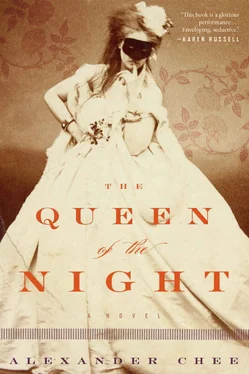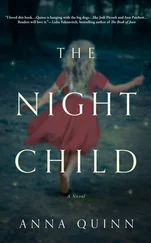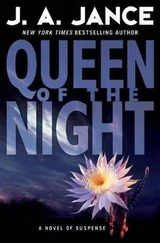Would we recognize each other then? I wondered.
The belief we would be reunited, that the world would organize itself to bring us together, this seemed comic at best set against the very real city around me now. All I risked, if I went to the Mabille that night, was to enter and find another woman beside him, leaning over the piano, pushing his hair back as he played — though that still had the power to keep me away.
This, at least, was what I told myself each time I took out and then put away my cancan shoes, which were too old now and, no doubt, out of style. And besides, it would be August; the city would begin to empty from the heat.
I instead took to returning to the opera house on my own, to sit outside of it, almost as if I were keeping it company; soon it became a regular pilgrimage. I stood on the sidewalk opposite the entrance and imagined my own likeness there, not among the busts of the composers, but along the roof, perhaps in the place of the golden Apollo, or joining him. I’d once thought the Empress to be ridiculous, having herself painted as a goddess, and yet there I sat at a table outside of a bistro sipping a coffee and imagining an image of myself shining down from the top of the Opéra Garnier.
After a month of these visits, I heard a voice behind me say, Can I enlist you to help me knock some of them off the roof?
I turned. My composer sat at the table behind me. He raised his glass and nodded at me.
There’s no room for me up there, he said.
The sight of him, a reproach for all of my doubts. The path to him had indeed led away from him to here.
I did recognize him. His face had thinned instead of thickening, a sign of, perhaps, difficult times for a man. I wondered for just an instant if he recognized me as well, and then he said, I searched for you.
I sat still, shocked, unable even to move.
The other grisettes said you had run off. With that tenor singer. I wondered where you could have run off to, and it would seem you ran here. I hoped it would be.
He was here, he was talking to me, he had looked for me.
I had hoped it would be me. I never had the honor of your name, he said.
If I had to die here in the war to come, at least he was here with me. Though as I looked at him, the old fears — that we were watched or would be discovered — returned the louder. I studied the area around us for signs someone was watching us, but there were none. Perhaps our watchers had abandoned us.
I wanted to imagine my fears were senseless, but I knew better. That seemed to be the mistake I made each time.
Please excuse me, he said, and he came to my table and made a bow. I am Aristafeo, Aristafeo Cadiz. My name means “ugly knob.” My mother invented it, as she felt I’d ruined her looks. But I like it, as I don’t think anyone else has this name. I’ve been watching you come here for several weeks and wanted to be sure it was you before I spoke to you. It is you, yes?
Lilliet Berne, I said. And then I added, Falcon soprano, most recently a student of Pauline Viardot-García’s in Baden-Baden and newly returned to Paris. I am here in case of war, apparently. Should Paris need to be defended by sopranos.
He smiled. I devoutly wish it will not come to that, he said. I congratulate you. You did well to run off; you must be an extraordinary singer to have been her student. I’m honored. This means you have seen her copy of Don Giovanni written in the master Mozart’s own hand?
I said I had.
I look forward to hearing you sing. I must ask you, I thought I knew you another way, he said.
What way is this? I asked.
I used to play in the band at the Cirque d’Hiver, and there was a rider there I fell in love with. She was beautiful and so quiet. The other girls were so crass and loud, but she said nothing, not once. She was let go before I could speak to her. I would see her also at the Bal Mabille, where she seemed more lively. But I was playing in the orchestra there and could not stop playing to ask her to dance.
You should have, I said. You should have asked her to dance.
Then, I suppose, she was let go again, from whatever job she had, he said, for I saw her next as a maid at Compiègne.
I stared at him, uncertain as to whether I should laugh or run.
How many women are you? he asked.
A legion, I said. How many orchestras have you played in?
All of them, perhaps, he said, smiling.
I heard the chiming of the clock behind us and knew I had to return.
Monsieur, I said. If you’ll please excuse me, I must take my leave of you.
Mademoiselle Berne, please, he said, still holding my hand. We were just getting to know each other.
I nodded and could not stop the smile on my face.
I did not dare let him into this life here, not yet. It was too soon. And yet I did not dare let him go. But surely the tenor could not begrudge me an accompanist.
I slid a card from my calling-card case, the one the tenor had given me to give to my dressmaker.
Is it beneath you, I asked, if I ask you to rehearse with me? I must prepare for my debut.
I have looked for you everywhere, he said. Everywhere but here, and he smiled, holding up the card before putting it inside his jacket’s ticket pocket. Consider me your servant.
Call on me there, I said. Tomorrow. Come for tea. I will try to explain everything.
He laughed out of surprise and shock, and then said, a little louder, Until then, and then he bowed until I walked away.
§
When Aristafeo arrived the next day, Doro showed him in, her surprise at his arrival kept from her face except, as she entered, her eyes, full of fear.
The tenor was in rehearsals, I knew, and would not be free until well after dinner. We had hours alone.
Thank you for coming to rehearse with me, I said, loud enough for Doro to hear as she left. My skills with the piano are rudimentary at best, and the piano is out of tune.
Aristafeo did not flinch in the slightest. Of course, he said.
The music room is this way, I said. If you’ll follow me?
He followed, and I drew the doors shut. As he passed me, I whispered, Play anything.
He smiled as he sat and began something that began in arpeggios and wild flourishes, and then settled into a melody, sweetly sad. As I walked to the piano bench, the pleasure of hearing him play again filled me. It was like it had been the first time, being admitted to a place where only the two of us existed. But on this afternoon, it was also exactly like being somewhere only the two of us could speak to each other.
For I was sure Doro would have to listen in on me as part of her duties.
Now it is harder for us to be overheard, I said.
Yes, he said. You’re good.
Will you remember this? I said. This theme you are playing?
Of course, he said.
Play it for me always, then, I said. When I ask for it.
Of course, he said. He met my eyes and did not pause. What am I here to help you with? Or is this song the one you wanted?
I set out the music for Bellini’s La Sonnambula.
You can adapt it for piano? I asked.
He raised his eyebrows in mock contempt. Of course, he said. I won’t refuse you anything I can do.
Please, I said, as he studied it. Let’s begin.
I sat silently, afraid even to meet his eyes, as he found his way through the music confidently. I only watched his fingers as they moved along the keys. The long hours of sitting on the Empress’s bench, waiting for her to ring for me, listening to him in memory, had become the long hours of listening to Pauline play the Chopin nocturne in Baden-Baden almost every night as night fell. I knew it well enough to ask for it by name, though I didn’t dare to, not yet. I still felt guilty that I had given up on him, that I had believed myself foolish to think he cared for me. This man now beside me, playing for me, hidden in my past, who had somehow kept watch over me this whole time, close but not close enough until yesterday afternoon.
Читать дальше












